Best Speakerphone Medical Alert Systems of 2025
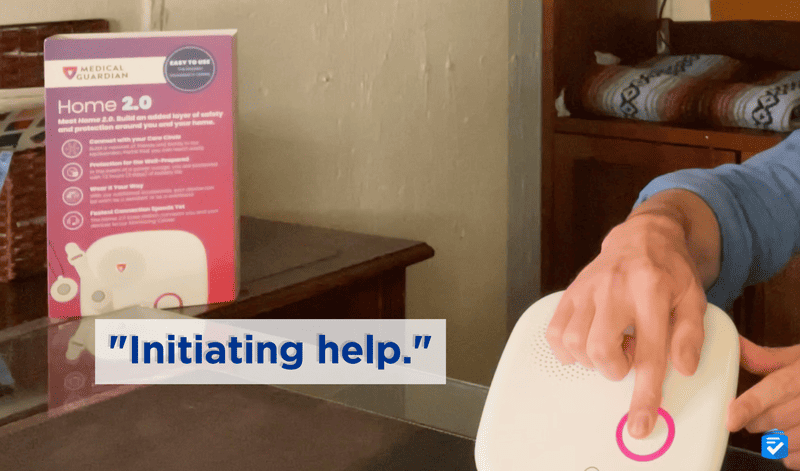
Key Findings
- Bay Alarm Medical systems have voluble speakerphones and fast response times, all while costing less than average.
- The Lively Mobile2’s speakerphone was louder than that of any other mobile system we tested.
- Medical Guardian systems, while slightly more costly, have the fastest response times of any brand we’ve tested.

Why Trust Us?
At TheSeniorList, our team of caregivers, experts, and healthcare professionals conducted over 5,000 hours of in-depth research and testing to recommend the most reliable brands and devices. In this process, our team:
- Tested 50 medical alert devices from 15 different brands.
- Surveyed 1,250 seniors and caregivers on medical alert system usage.
- Consulted with nurses, EMTs, and caregivers who are experts at caring for older adults.
- Published dozens of videos that demonstrate our medical alert system testing.
- Evaluated verified customer reviews of medical alert companies from the Better Business Bureau.
How We Test Medical Alert Systems
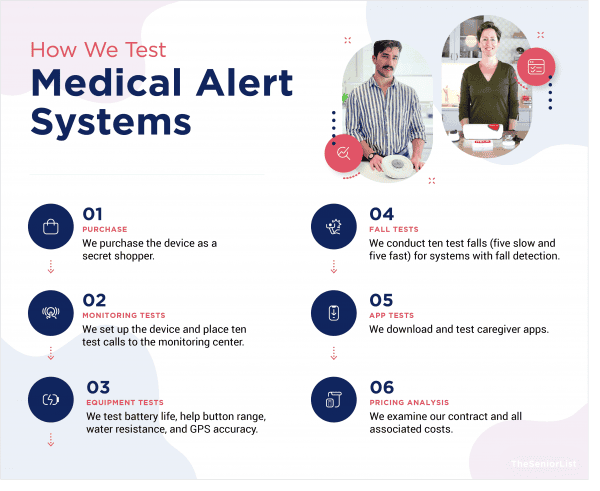
Nowadays, most medical alert providers have some form of a speakerphone. Here is what I looked for when choosing my favorites:
- Size: Help buttons should be small and light enough that they’re comfortable to wear 24/7. Most help buttons can be worn as a necklace or bracelet, but some people prefer to place them in their pockets or bags.
- Long range: With home systems, you have to be within a certain distance of the hub or base station in order for your button to stay connected to the monitoring center. This distance ranges from 600 to 1,400 feet, but the size of your home determines your needs for range.
- Affordability: While some companies offer free equipment, you could spend anywhere from $100 to $150 or more on equipment. Then there’s an additional $30 to $50 each month for monitoring, with $10 extra per month for fall detection. Some companies charge activation fees, while others do not.
- Speakerphone volume: For people experiencing hearing loss, medical alert systems need speakers loud enough to hear on the other side of the house. All medical alert systems include speakerphones, but I prioritized the loudest ones for this article.
FYI: If you’re looking for my favorite devices overall, then you should check out my list of the best medical alert systems for seniors.
The Best Speakerphone Medical Alert Systems
- Bay Alarm Medical : Waterproof Help Buttons
- Lively : Best Caregiver App
- Medical Guardian : Shortest Response Time
1. Bay Alarm Medical - Waterproof Help Buttons
What We Like Most:
- Waterproof help button
- Free equipment
- 16-second response time
- Loud speakerphone
Overview
Bay Alarm Medical offers a cellular or landline home system, two mobile systems, and one package that combines home and mobile. However, no matter which product you choose, you’ll get a speaker you can hear loud and clear.
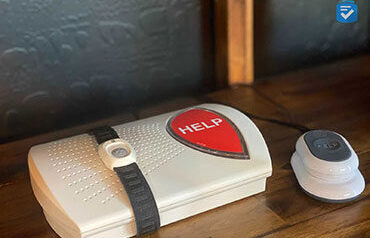
Standout Features
I bought the SOS Home, an in-home system that includes a base station and help button. It was functional so long as I was within 1,000 feet of the base station. Much to my delight, I could hear the speakerphone even when I was at that maximum distance. Moreover, when I did a fake fall, I got a response within 16 seconds. Compared to some other systems like Life Alert, which took 30 seconds to get back to me, this is pretty good. After all, every second counts in an emergency.
Along with my physical system, I got access to the free Bay Alarm Medical app, which let me see my help button’s battery level and location. That’s helpful if you need spouse monitoring or monitoring for another loved one. Plus, you won’t have to pay any more money each month to monitor more than one person. I was able to add an automatic fall detection button as well, which meant I didn’t need to push a button to get help.
Pricing
Bay Alarm Medical prices are pretty low, especially because the company doesn’t charge for the SOS Home itself. (I only paid $30 for the extra fall button.) Rather, prices start at $24.95 a month for the landline in-home system, $29.95 for the cellular in-home system, or $39.95 for the cellular in-home system with fall detection.
All contracts are monthly, there are no activation fees, and I got to try my system for 30 days. If I hadn’t liked it, I could’ve returned it and received a full refund. This is not the case for every company; for example, Medical Guardian lacks a trial period altogether.
Drawbacks
With other systems, I didn’t have to buy a separate $30 pendant for fall detection. Rather, with the Lively Mobile2 and the Medical Guardian MGHome Cellular, I just had to pay about $10 more per month and use my existing devices. So with Bay Alarm Medical, fall detection costs $30 extra, as I still had to pay that additional $10 each month.
Our Verdict
If you want a landline or cellular system and are okay with paying a bit extra for fall detection, the SOS Home will be the system for you. To learn more about Bay Alarm Medical, read my hands-on Bay Alarm Medical review.
Pros
- No long-term contracts
- Mobile GPS tracking
- Caregiver features
- Affordable systems
Cons
- No built-in fall detection
- Poorly-rated Android app
2. Lively - Best Caregiver App
What We Like Most:
- Alexa voice commands
- 40-hour standby time
- 13-second response time
- Great caregiver tracking app
Overview
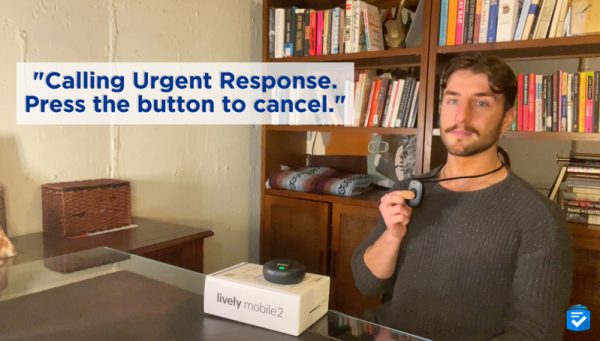
Unlike Bay Alarm Medical and Medical Guardian, Lively offers only one device, the Lively Mobile2. While small, the Mobile2 packs in a voluble speakerphone, accurate GPS, and even fall detection.
Standout Features
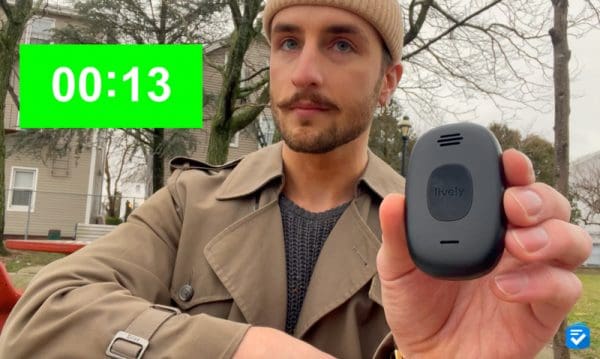
The Lively Mobile2 is a compact medical alert system that consistently delivers quick response times. In my ten test calls, agents answered in an average of 14 seconds, among the fastest I’ve tested.
My favorite feature of the Mobile2 had to be the Lively Link app. This app lets me see the GPS location of the Mobile2 as well as changes in the user’s daily activity, the device’s system status, and its battery level. Caregivers can speak to each other through the app; their loved ones can get push notifications if the user has an emergency. This makes it easy for caregivers to stay on top of someone’s health and wellness, even if they can’t be physically present.

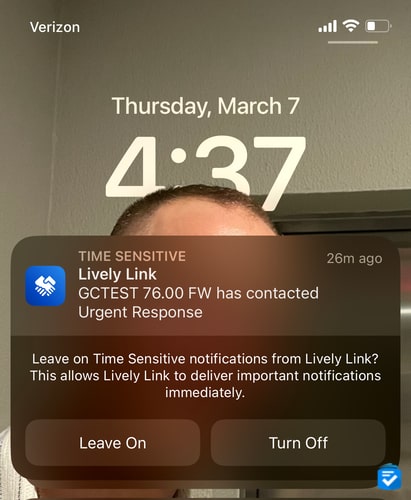
Pricing
Lively Mobile2 prices consist of $79.99 for the device itself and either $24.99 or $34.99 for monitoring. With that higher-tier, $34.99-a-month plan, I got 24/7 access to an on-call nurse who could answer any questions I had, plus a “care advocate” to help me meet my health goals. Like Bay Alarm Medical, all of Lively’s contracts are monthly. But unlike Bay Alarm, Lively charges an activation fee: $25 for an online activation or $35 over the phone. Lively has a 30-day return policy and a one-year manufacturing warranty.
Drawbacks
The biggest downside to the Lively Mobile2 would have to be how high its costs can get. While monthly subscriptions start at $24.99, they’ll be $34.99 if you want the nurse hotline feature. Fall detection will cost an extra $10 per month. So while prices start low, they can get pretty pricey.
>>Read more: Alexa Together Review
Our Verdict
Whether or not you want Alexa, Lively offers a mobile system with a powerful speaker in the Mobile2. To learn more about my experience with this system, read my Lively Mobile2 review.
Pros
- Fully waterproof
- No contracts or cancellation fees
- Loud two-way speaker
- Alexa integration with Echo device
Cons
- One-time device fees
- Can only be worn as a pendant
3. Medical Guardian - Fastest Response Time
What We Like Most:
- 8-second response times
- 1,400-foot range
- 32-hour battery backup
- Caregiver tracking
Overview
I’ve tested out all of Medical Guardian’s systems, three mobile and two in-home, to be exact. No matter which system I tested, response times were as little as eight seconds, the fastest I’ve ever seen.
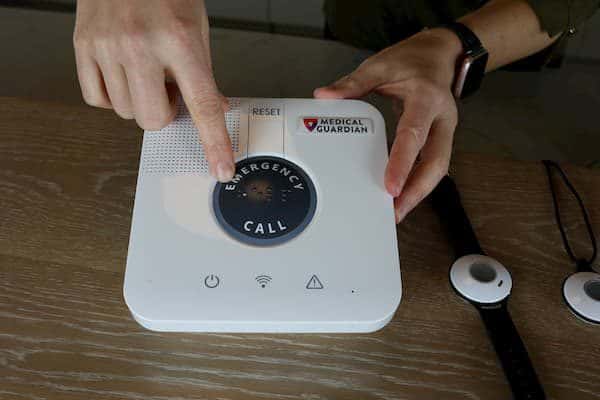
Standout Features
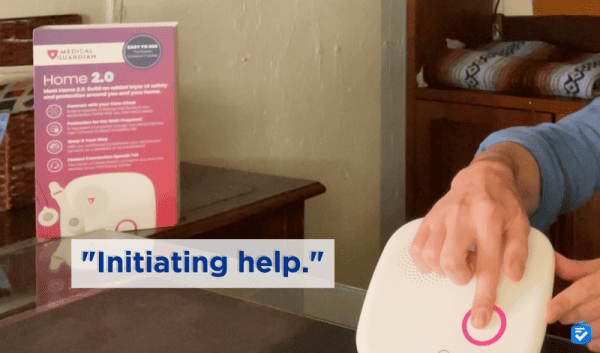
For a loud speakerphone you can hear at the other side of the house, I recommend the MGHome Cellular, a cellular, in-home system with a long, 1,400-foot range. When I did a test fall, I got a response in less than 10 seconds.
The system consists of a hub and a pendant, which you can wear as a bracelet or a necklace. (I chose the necklace option.) While the hub connected to an outlet in my living room, if my power went off, it would have stayed on for an additional 32 hours due to its backup battery. This gave me great peace of mind.
I tracked my device through the MyMedicalGuardian app, which let me see its battery status, location, current system status, and connectivity history. If you are a caregiver, this app will give you the assurance that the device is on, connected, and charged.
Pricing
Medical Guardian prices, while still reasonable, are the highest on this list. First of all, I paid $149.95 for the MGHome Cellular equipment and then $38.95 per month for monitoring. Fall detection costs an extra $10 per month, although it doesn’t require a separate device like with Bay Alarm Medical.
Now, one key difference of note is that, unlike Lively and Bay Alarm Medical, Medical Guardian does not offer a trial period. Commitment-phobes, beware; once you’ve purchased this equipment, it’s yours.
Drawbacks
While Lively and Bay Alarm Medical’s help buttons are fully waterproof, Medical Guardian’s are only water-resistant. While it can repel water for a short time, it can’t be submerged for longer periods of time. When I was taking a bath, I had to have it nearby or pay $2.99 or $4.99 a month more for a wall-mounted help button.
Our Verdict
For the fastest response times, arguably the most important aspect of a medical alert system, choose the MGHome Cellular. To learn more about this company, read my full review of Medical Guardian.
Pros
- Fastest response times
- Optional fall detection
- 32-hour battery backup
- 1,400-foot range
Cons
- Water-resistant button
- Poorly-designed apps
Bottom Line
The best speakerphone medical alert systems can be heard from different floors of a home, especially if you have hearing loss. Hopefully, one of these medical alert systems meets your needs. If not, check out one of my list of the best voice-activated medical alert systems for more potentially life-saving options.




